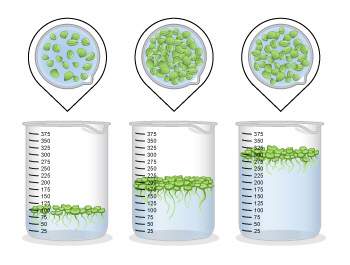
Biology, 05.10.2019 22:30 machucagm01
Sophia is testing an effect of different volumes of water on the growth of duckweed. she set up the experiment that is shown below. three beakers, all the same size, are set up with cool tap water and duckweed in them. the first beaker contains 100 ml of water and 20 fronds of duckweed. the second beaker contains 200 ml of water and 50 fronds of duckweed. the third beaker contains 300 ml of water and 40 fronds of duckweed..
based on this setup, the most likely source of error in this experiment is
a)the sizes of the beakers that are used.
b)the depth of the water in each beaker.
c)the temperature of the water in each beaker.
d)the number of duckweed plants in each beaker.


Answers: 2
Another question on Biology

Biology, 22.06.2019 06:20
What makes a dominant allele different from a recessive allele
Answers: 2

Biology, 22.06.2019 06:50
The kidney filters potentially toxic substances in the blood, and thus “clears” the blood of those substances. this clearance function is dependent upon and proportional to the diffusion gradient of the substance across filtering capillaries, i.e. if the concentration of the substance is doubled, twice as much will be cleared from each ml of blood that is filtered. suppose that the body produces a constant amount of a substance x per unit of time. the kidneys eliminate substance x at a rate directly proportional to the concentration of the substance and the volume of blood cleared each minute (c): elimination = c × [x], where [x] is the steady-state concentration of substance x. imagine an individual with an initial concentration of x equal to [x]0 who develops kidney disease. her baseline clearance c0 drops to one half of the original (½c0). what is the new steady state concentration of x? (for simplicity, assume that substance x is 100% filtered by the kidney).
Answers: 1

Biology, 22.06.2019 07:00
Which best describes the scientific method? a. a path of clearly defined steps that must be followed in a particular order b. a possible answer to a scientific question based on knowledge or research c. the recipe for how to conduct an experiment that must be followed precisely d. the process of hypothesis and testing through which scientific inquiry occurs
Answers: 1

Biology, 22.06.2019 11:30
2. cheryl hears a new song on the radio every day during the week on her commute to work. surprisingly, when the song comes on at a party on saturday night, she knows most of the words without trying. describe the three ways that we use cognition to learn without reinforcement. which type of cognitive learning without reinforcement best explains how cheryl knew the song lyrics? explain your answer.
Answers: 1
You know the right answer?
Sophia is testing an effect of different volumes of water on the growth of duckweed. she set up the...
Questions



Social Studies, 08.10.2019 22:30

Mathematics, 08.10.2019 22:30



English, 08.10.2019 22:30

History, 08.10.2019 22:30




Mathematics, 08.10.2019 22:30

Mathematics, 08.10.2019 22:30

Health, 08.10.2019 22:30

Social Studies, 08.10.2019 22:30

History, 08.10.2019 22:30

Computers and Technology, 08.10.2019 22:30





